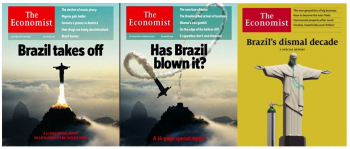FGV Social was present in The Economist's latest special report on Brazil. For the third time in 12 years, the magazine features the iconic image of Christ the Redeemer on its cover. Marcelo Neri, director of FGV Social, was present in all 3 reports talking about Brazilian social reality.
The first time the monument was on the cover was in 2009, with the statue “taking off” – a moment where Brazil was “about to take off” (Brazil takes off). In 2011, FGV Social also made reference to the magazine's cover in the survey “The Emergence of Emerging People: Global Reflections and Local Actions for the New Brazilian Middle Class”. It was the moment when Brazil joined Russia, India and China, forming the BRICs, emerging economies growing rapidly in the mist of the so called European crisis. On the research’s cover, Christ the Redeemer took off (as well as in The Economist) along with the main monuments of the BRICS (see the survey's teaser video with animations of the images by clicking here).
We were still experiencing the boom of the new middle class occupying a prominent position on the agenda of private companies, public managers, politicians and other Brazilians, as can be seen elsewhere. In a time of global stagnation observed after the 2008 international crisis, the economic and social rise of tens of millions of people helped to keep the global economy turning. The research discusses global and local aspects of the rise of Brazilians - analyzing differences and similarities of emerging groups between emerging countries.
Christ the Redeemer appeared for the second time on the magazine's cover in 2013, but this time falling after having taken off (reference to the 2009 cover) - "Did Brazil screw it up?" (Has Brazil blown it?), announced the publication. The magazine showed that after growing 7.5% in 2010, in the midst of a global crisis, the country grew only 0.9% in 2012. GDP growth was nicknamed mini GDP (pibinho) at this point
On the third cover, in June 2021, the focus has now shifted to the crisis caused by the Covid-19 pandemic. Christ the Redeemer is now “in a coma” with a mask attached to an oxygen tube with the phrase “On the brink” headlining the special version magazine and the phrase “Brazil's dismal decade” on the main cover. According to the publication, which featured a 10-page special on Brazil, the country is currently facing its biggest crisis since the return of democracy in 1985.
Marcelo Neri showed in the article that Brazilians' perceptions of well-being exceeded GDP growth, showing that Brazilians feel better than they actually are. The Economist included FGV Social data, based on the Gallup World Poll, that showed that between 2006 and 2009 Brazil rose five positions in the ranking of happiness, reaching the 17th position among 144 countries.
A recent survey launched by FGV Social showed that Brazil had a drop of 0.4 points in its happiness score throughout 2020, reaching 6.1, the lowest point in the historical series since 2006. The drop in happiness occurs in the poorest 40% (-0.8%) and in the middle group (-0.2) situated between the 40th and 60th percentiles of income. The wealthier groups, on the other hand, maintained their satisfaction with life. In other words, there is an increase in the inequality of happiness during the pandemic. The difference in life satisfaction between the income extremes, which was 7.9% in 2019, rises to 25.5%. The survey also showed point measures of well-being that asked about emotions felt in relevant amounts on the eve of the survey, such as feelings of anger, worry, stress, sadness and fun. The sense of anger among Brazilians rose from 19% in 2019 to 24% in 2020, a change of 5 percentage points. In the world, this advance was 0.8% percentage points. In other words, anger increases 4.2 percentage points more in Brazil during the pandemic than in the rest of the world. Similarly: worry, stress and sadness rose by, respectively, 3.6, 2.9 and 2.2 percentage points more in Brazil than in the rest of the world. All subjective indicators of well-being considered worsened more in Brazil in the pandemic than the average of the other 40 countries analyzed.
Research "Inequality and Well-being during the Pandemic in Brazil".
The Economist 2021 - https://www.cps.fgv.br/cps/bd/clippings/yc0807.pdf
The Economist 2013 - https://www.cps.fgv.br/cps/bd/clippings/ipc1871.pdf
The Economist 2009 - https://www.cps.fgv.br/ibrecps/clippings/The_Economist_14.11.2009.pdf





